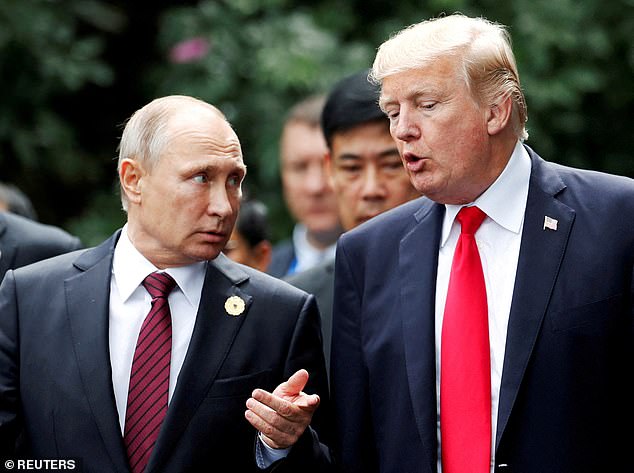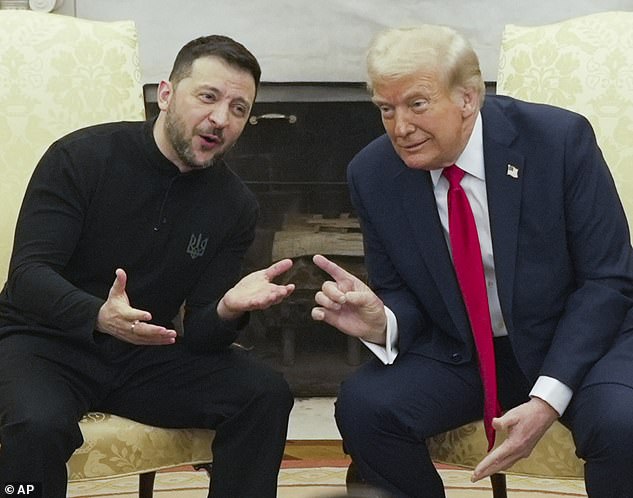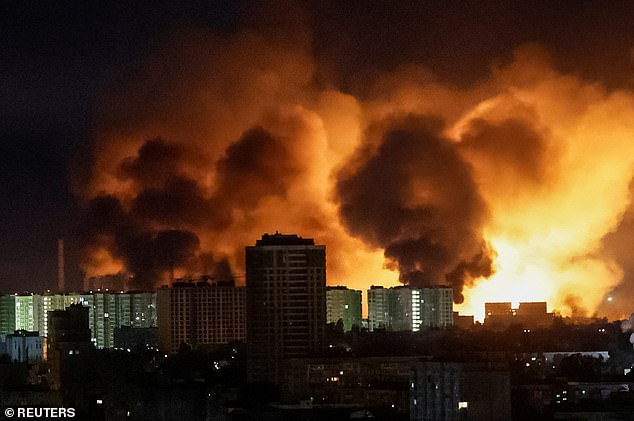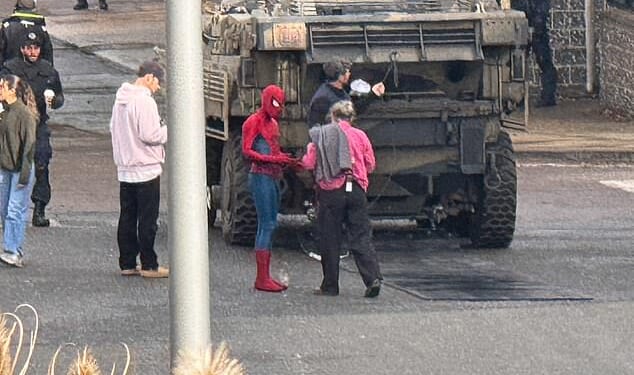Donald Trump’s pretentions to be a world statesman whose name will resound down the ages is about to be brutally tested.
On Friday he will sit down in Alaska with his exasperating frenemy Vladimir Putin for what has the potential to be one of the most significant leader-to-leader summits of recent history, up there with Ronald Reagan and Mikhail Gorbachev’s Geneva lakeside love-in 40 years ago which presaged the end of the Cold War.
The meeting should give the clearest indication thus far of whether there is any realistic possibility of a negotiated settlement of the war in Ukraine any time soon.
Also at stake are the reputations and ambitions of both men. Trump will want to prove that there is real weight to his claims to be a genius peacemaker whose wheeler-dealing approach to global politics succeeds where conventional diplomacy has failed.
He is up against a negotiating partner who will be using all of his KGB-honed wiles to feign sincere desire for a settlement while conceding nothing that could undermine his bucket-list determination to restore at least some of Russia’s historic frontiers before he passes from the scene.
Until now, relations between the two have defied easy analysis. Trump’s feelings for ‘Vladimir’ see-saw between queasy expressions of affection to anger when he thinks he is being jerked around. Putin, meanwhile, has proved a master at stringing him along with flattery and flannel.
On Friday their personal chemistry will interact in laboratory conditions. Whether the result is a breakthrough or a bodge-up, it will have profound implications for both men, as well as for Ukraine and the rest of the world.
To a crucial extent, the result will depend on the personal motivations of the participants rather than considerations of national interest. Questions of international law, let alone morality, will play little or no part.

President Donald Trump and Russian President Vladimir Putin at a meeting in 2017

President Donald Trump meets with Ukrainian president Volodymyr Zelenskyy in the Oval Office in February
Both men are obsessed with legacy. Putin is a nostalgic imperialist who wants to be remembered as the man who made Russia great again. He sincerely believes that the eastern provinces of Ukraine can only ever be Russian – a credo that recently revealed German foreign ministry files shows dates back to at least the early 1990s. Winning de facto recognition of Russian ownership of recent conquests, as well as Crimea, will be a minimum condition of any agreement.
Trump’s chief concern is himself. Having accumulated great wealth and enormous power, he now craves secular sainthood in the form of a Nobel Peace Prize. He is intensely irritated by the fact that the man he replaced in the White House in 2017 was awarded one within a year of becoming president, complaining last year: ‘If I were named Obama I would have had [it] given to me in ten seconds.’
Settling the Ukraine war – which he notoriously claimed on more than 50 occasions he would achieve within 24 hours of taking office – seemed a sure route to Nobel glory. When the reality proved more intractable he seemed to lose interest in Ukraine and in the spring seemed likely to walk away from the imbroglio.
Success in bringing a swift end to the Israel-Iran clash in June has revived his hopes of taking his rightful place alongside Nobel laureates such as Mother Teresa and Nelson Mandela. Trump has been taking credit for ‘solving’ other conflicts involving India and Pakistan, the Democratic Republic of Congo and Rwanda, Cambodia and Thailand and also Armenia and Azerbaijan.
Having shown no interest in these places before, this appears to be an exercise in burnishing his peacemaker credentials for the benefit of the five Norwegian worthies who make up the prize committee.
Hunger for the accolade rather than any positive developments on the diplomatic front seem to be the main driver behind Trump’s pursuit of a summit.
Leaks from the recent meeting between Trump’s special envoy Steve Witkoff and Putin suggest there has been no significant weakening of Russia’s hardline positions. Moscow will insist on maintaining control of most of the territory seized in eastern Ukraine and could even demand that Kyiv hand over parts of Donetsk province that it has yet to capture.
It will also be seeking a ban on Ukrainian membership of Nato and crippling restrictions on the future size of Ukraine’s military, as well as a halt to Western weapons supplies.

Kyiv, in Ukraine, alight after more Russian drone strikes in May
The noises coming from Washington suggest that none of this is off the table and that at least some of Russia’s key demands are likely to be endorsed. On Friday, Trump blithely predicted that there ‘will be some swapping of territories’ in order for Moscow and Kyiv to reach an agreement, provoking strong protests from Ukraine’s President Zelensky.
But Ukraine’s voice will count for little – Zelensky has not so far been invited to the talks – and nor will that of Britain, France and Germany, who have been reduced to anguished invocations of the sanctity of international borders.
Inexplicably, Trump continues to treat Putin as an equal when in reality the US massively overmatches Russia in power and wealth. He has always had the ability to impose real pain on Moscow that would force Putin to sit down to proper negotiations.
Despite some harsh words, threats of sanctions, Armageddon and military posturing – like recently sending nuclear submarines closer to Russia – there is no sign that he is about to do that now.
Putin has little reason to give ground. Russian forces are slowly but steadily advancing on the battlefield, apparently capable of absorbing losses that would impress a First World War general. In prospect in Alaska is an old-fashioned, big-power territorial carve-up that rewards the strong and punishes the weak.
Confronted by a Trump-Putin tag team agreed on the ingredients for a settlement, Zelensky would face a dreadful dilemma and whatever choice he made would hand a huge win to his enemies. Whether or not the deal involves ceding sovereignty of captured territory, officially accepting its at least temporary loss will give Putin a solid lodgement from which to pursue his aggression and usher in a future of perpetual insecurity for Ukraine.
But if Zelensky rejects the offer, Trump’s wrath is guaranteed and Kyiv is potentially left to fight on, supported only by a Europe that is in no position to fill the gap left by America’s departure.
Such an outcome would be more than a heavy blow to Ukraine. It would be a dark portent for all our futures. If Putin emerges from Friday’s meeting with a deal he feels comfortable with, it will mark the start of a new age in which might is always right and tyrannical aggression goes unpunished.
And Alaska 2025 will not be remembered alongside Geneva 1985. Instead, it will go down in history as another Munich 1938.
- Patrick Bishop is co-host of the Battleground: Ukraine podcast











